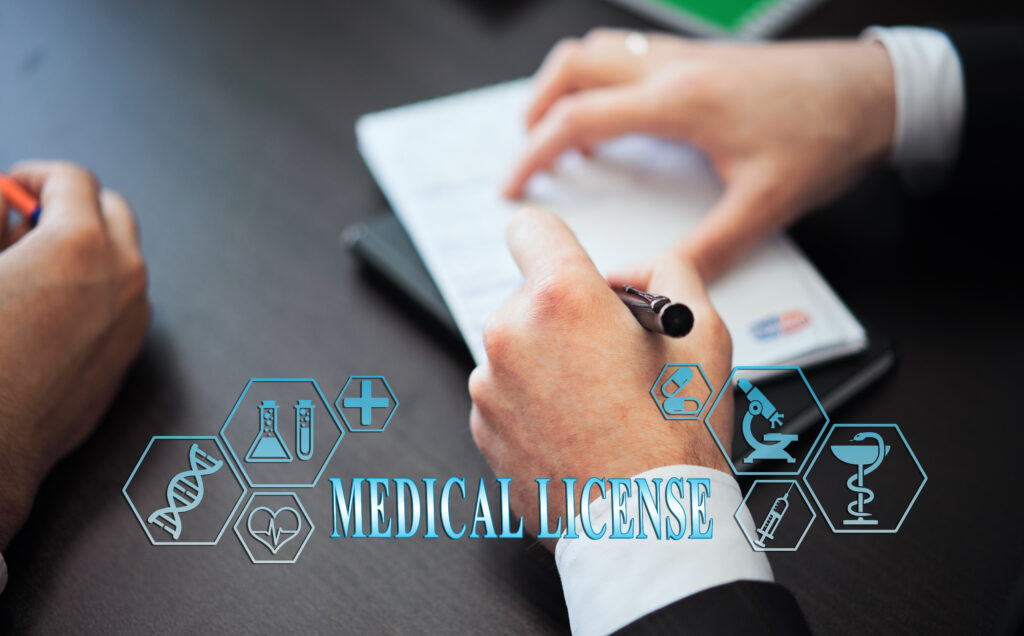An OVI (operating a vehicle while intoxicated) charge can cause you to lose your professional license if you’re a nurse in Ohio. If you face an OVI, a Sandusky DUI lawyer can explain how it will affect your career in nursing and the steps you need to take.
Reporting Requirements
First, Ohio calls what other states refer to as a DUI or DWI an OVI.
If you’re a nurse in Ohio and face OVI charges, you must report it to the Ohio Board of Nursing. It is part of your duty as a licensed nurse. Not reporting can lead to more problems.

Have your OVI lawyer report the charges as soon as possible, providing the necessary details about the incident. Once you’ve reported, the Board will review your case to see if it affects your ability to work as a nurse.
The outcomes can vary – you might face no action or need to take extra training or have more supervision at work. In some cases, the licensing board can suspend your license.
Before reporting, get advice from a lawyer. Remember, making a mistake doesn’t mean you’re not a good nurse, but how you handle the mistake matters. Reporting an OVI to the Board shows that you take responsibility and uphold the integrity of your profession.
Potential Impact on License
When you’re a nurse in Ohio, and you get an OVI, it’s more than just a legal issue – it can directly impact your nursing license. After you report your OVI to the Ohio Board of Nursing, they will investigate your case. This process is crucial because it determines how your professional license will be affected.
Here’s what the investigation might involve:
- Examining the OVI Details: The Board will look closely at your OVI case. They’ll want to know about the circumstances of the OVI, like how it happened and your behavior during the incident.
- Evaluating Your Professional Conduct: They will also assess if your OVI reflects your professional conduct as a nurse. This is because nurses are expected to maintain certain standards in and out of the workplace.
- Considering Past Behavior: If you have a history of legal issues, especially related to substance use, the Board will take this into account. They’ll look at your entire record, not just the current OVI incident.
- Potential Actions by the Board: Depending on their findings, the Board can take various actions. They might issue a warning if it’s a first-time offense and no one was hurt. However, for more severe cases, they might suspend your license temporarily or place you on probation. In the most severe cases, where the OVI suggests a significant professional conduct or public safety issue, the Board might even revoke your nursing license.
- Opportunity for Defense: You’ll likely have a chance to defend yourself. This can involve explaining the situation, showing evidence of rehabilitation, or demonstrating your commitment to nursing.
- Impact on Your Career: Any action taken by the Board can affect your career. A warning or probation might not stop you from working but can impact your reputation. On the other hand, a suspension or revocation can halt your career temporarily or even permanently.
Throughout this process, it’s wise to understand the seriousness of an OVI and its potential to affect your nursing license. Preparation and information about the consequences can help you navigate this challenging situation more effectively.
Remember, an OVI doesn’t just stay in the courtroom – it also reaches into your professional life.
Factors the Board Considers
When the Ohio Board of Nursing reviews an OVI case involving a nurse, they consider:
- The severity of the OVI: How severe the OVI was, including blood alcohol level, any damage, injuries, or wrongful death, and behavior during the incident.
- Previous Legal Issues: Past legal history, particularly related to substance use, to identify any behavior patterns.
- Relevance to Nursing Role: How the OVI reflects on professional conduct and potential risks to patient safety.
- Your Response to the Charge: Post-charge actions include accepting responsibility and seeking treatment.
- Impact on Public Trust: Evaluation of how the OVI affects public trust in nursing.
- Mitigating Circumstances: Consideration of any personal challenges or factors at the time of the OVI.
- Rehabilitation Efforts: Efforts made towards rehabilitation, like participating in education programs or counseling.
These factors help the Board determine the appropriate response to ensure nurses maintain the profession’s standards and public safety.
Steps to Take After an OVI Charge
Getting charged with an OVI can be a scary and confusing time, especially for nurses. It’s not just about dealing with the law. It can also affect your job and future. Knowing what to do next is vital if you find yourself in this spot. The first thing you should do is seek legal advice.
Seek Legal Advice
When you face an OVI charge, understanding the law and its meaning is key. OVI laws are different in each state and can be complex.
A lawyer who knows about OVI cases can make sense of everything. They can explain what the charges mean, what might happen next, and how you can defend yourself. It is extra important for nurses because an OVI can affect your nursing license and your career.

Finding a lawyer who has dealt with OVI cases is best. They should have a history of helping people who have been in the same situation as you. You can start by asking people you know for suggestions or look online for lawyers near you who work with OVI cases.
When you meet with a lawyer, they will talk to you about your case. They’ll ask about what happened and want to know all the details. Be honest and give them all the necessary information.
They’ll use this information to help you. They might talk to you about how the court process works and what can happen in your case. They can also explain how your OVI charge might affect your nursing license.
Remember, an OVI charge doesn’t have to be the end of your career or define your future. With the right help and guidance, you can work through this challenging time. Seeking legal advice is the first and most crucial step in this process.
Be Ready for the Board’s Review
After an OVI charge, one of the significant steps you might face is dealing with the Board. The Board is a group of people who look at your nursing license and decide if you can keep working as a nurse. If they call you in, they want to hear your story. Here’s how you can get ready for this important meeting.
First, it’s critical to understand how serious an OVI is. It’s not just about breaking the law; it’s also about safety and trust. As a nurse, you’re trusted to care for people and make good choices. An OVI can make the Board worry about whether you can be trusted with these responsibilities.
When you talk to the Board, being honest is the best approach. Tell them exactly what happened. Don’t try to hide anything or make excuses. They will appreciate your honesty, showing them you’re taking this seriously.
The Board will want to see that you understand how an OVI can impact your job as a nurse. It’s not just about you; it’s about the patients you care for and the trust you need to do your job. Talk about what you’ve learned from this experience and how you plan to ensure it doesn’t happen again.
You should also be ready to discuss the steps you’ve taken since the OVI. This can be things like attending a driving safety class, counseling, or joining a support group. These actions show that you’re working hard to improve and you’re serious about being a responsible nurse.
Bring any essential papers with you to the meeting. It can include a copy of the police report, court documents, and records of any classes or counseling you’ve attended. These documents show that you’re organized and ready to discuss your case.
Consider Rehabilitation Programs
If your OVI was because of alcohol or drug use, thinking about rehab or counseling might be a wise step. This shows you’re serious about getting better and taking care of any problems that led to the OVI.
When you get an OVI because of alcohol or drugs, it can raise concerns about your health and decision-making. By choosing to go into a rehab program or get counseling, you’re showing that you’re dealing with these issues head-on. This is especially important for nurses, as you must be in good shape to care for others.
There are different types of programs you can consider. Some are inpatient, where you stay at a facility for a while. Others are outpatient, where you go to meetings or sessions but live at home. The right program depends on your situation and what kind of help you need.
These programs do more than help with alcohol or drug problems. They also teach you ways to handle stress and make better choices. They can help understand why you turned to alcohol or drugs and give you tools to avoid it in the future.
Going to rehab or counseling isn’t just about getting help; it’s also about showing others that you’re committed to change. When the Board reviews your case, seeing that you’ve joined a program can make a big difference. It shows them you’re taking steps to be a better nurse and person.
Keeping track of your progress is a good idea if you decide to join a program. It might be through certificates you get or notes from the program leaders. Sharing this progress with the Board and your lawyer can help. It shows that you’re not just talking about change but implementing it.
Protecting Your Nursing Career
An OVI charge can be a significant roadblock in your career, especially for nurses. Your nursing license is like a key that unlocks your ability to work and care for others. But when facing an OVI, it can feel like this key is slipping away. However, you can take steps to protect your career and future.
Understand the Importance of Your License

Your nursing license is more than just a piece of paper. It’s a sign that you have the skills and knowledge to take care of people when they’re sick or hurt. It also shows that you can be trusted with important responsibilities.
When you have an OVI charge, this trust can be questioned. That’s why it’s so important to understand the laws and rules that come with your license. You need to know what’s allowed and what’s not to ensure you’re always doing the right thing.
Learn from the Experience
OVI charges offer a tough lesson and a chance to learn and grow. You must show the Board that oversees nursing licenses and your workplace that you take this seriously.
You can do this by being open about what happened and showing that you’re working to make things right. This might mean attending rehab, counseling, or joining support groups. It’s about proving you’re committed to being a safe and responsible nurse.
Stay Informed
Laws and rules about nursing can change over time. This is why you must keep yourself updated, especially if you’re a nurse in Ohio.

Knowing the latest information about what the board requires of you as a licensed nurse can help avoid future legal troubles. This may involve reading up on new laws, attending workshops or seminars, or even talking to other nurses about changes in the field. Staying informed means you’re always prepared and doing your best to be a good nurse.
Contact an Ohio OVI Lawyer
An OVI in Ohio can have a significant impact on your nursing license. Take the charge seriously and take the proper steps to protect your career. Remember, a mistake doesn’t have to define your future as a nurse. With the right approach, you can move past it and continue providing excellent patient care.
